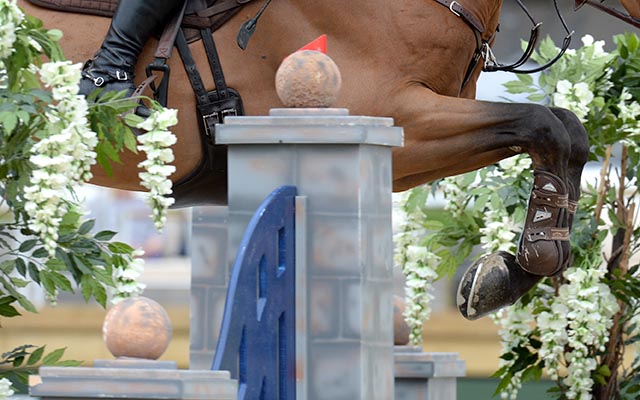A competition debrief helps a rider assimilate their experience, and provides valuable team information. Ellie Hughes talks tactics with riders and coaches...
PICTURE the scene: a top rider has just left the arena after a high-pressure test or round that has been crucial for Britain’s fortunes at a major championship. Emotions are running high and the atmosphere in the collecting ring is electric. The rider’s first port of call – sometimes even before dismounting – is a quick debrief with the team manager or trainer.
There is a pat on the back and heads are nodding, but what exactly are they talking about? Are they reliving the ride down the final treble, discussing what might have caused the missed tempi change, or is it a more general overview? Is a post-performance debrief something we can all benefit from and, if so, who should we enlist to help?
According to British eventing team coach Chris Bartle, what is said in the immediate aftermath depends entirely on the situation.
{"content":"PHA+4oCcT2Z0ZW4gaXTigJlzIGEgdGltZSBmb3IgbWUgdG8gbGlzdGVuLCBub3Qgc3BlYWss4oCdIGhlIHNheXMuIOKAnEl04oCZcyBhIGNhc2Ugb2YgYWNjZXB0aW5nIHdoYXQgaGFzIGhhcHBlbmVkIGFuZCBsZXR0aW5nIHRoZSByaWRlciB0YWxrIGlmIHRoZXkgd2FudCB0by4gU29tZSByaWRlcnMgY2xhbSB1cCBhbmQgd2FudCB0byBiZSBsZWZ0IGFsb25lLCB3aGlsZSBvdGhlcnMgYXJlIGtlZW4gdG8gdGFsayB0aHJvdWdoIHRoZWlyIHRlc3Qgb3Igcm91bmQgc3RyYWlnaHQgYXdheS7igJ08L3A+CjxwPkludGVybmF0aW9uYWwgZHJlc3NhZ2UgcmlkZXIgYW5kIGNvYWNoIEFkYW0gS2VtcCBzYXZlcyB0aGUgdGVjaG5pY2FsaXRpZXMgZm9yIGEgbG90IGxhdGVyLjwvcD4KPHA+PGRpdiBjbGFzcz0iYWQtY29udGFpbmVyIGFkLWNvbnRhaW5lci0tbW9iaWxlIj48ZGl2IGlkPSJwb3N0LWlubGluZS0yIiBjbGFzcz0iaXBjLWFkdmVydCI+PC9kaXY+PC9kaXY+PHNlY3Rpb24gaWQ9ImVtYmVkX2NvZGUtMzEiIGNsYXNzPSJoaWRkZW4tbWQgaGlkZGVuLWxnIHMtY29udGFpbmVyIHN0aWNreS1hbmNob3IgaGlkZS13aWRnZXQtdGl0bGUgd2lkZ2V0X2VtYmVkX2NvZGUgcHJlbWl1bV9pbmxpbmVfMiI+PHNlY3Rpb24gY2xhc3M9InMtY29udGFpbmVyIGxpc3RpbmctLXNpbmdsZSBsaXN0aW5nLS1zaW5nbGUtc2hhcmV0aHJvdWdoIGltYWdlLWFzcGVjdC1sYW5kc2NhcGUgZGVmYXVsdCBzaGFyZXRocm91Z2gtYWQgc2hhcmV0aHJvdWdoLWFkLWhpZGRlbiI+DQogIDxkaXYgY2xhc3M9InMtY29udGFpbmVyX19pbm5lciI+DQogICAgPHVsPg0KICAgICAgPGxpIGlkPSJuYXRpdmUtY29udGVudC1tb2JpbGUiIGNsYXNzPSJsaXN0aW5nLWl0ZW0iPg0KICAgICAgPC9saT4NCiAgICA8L3VsPg0KICA8L2Rpdj4NCjwvc2VjdGlvbj48L3NlY3Rpb24+PC9wPgo8cD7igJxXaGF0ZXZlciB5b3Ugc2F5IHRvIHNvbWVvbmUgd2hvIGhhcyBqdXN0IGNvbWUgb3V0IG9mIHRoZSBhcmVuYSB3aWxsIGdvIGluIG9uZSBlYXIgYW5kIHN0cmFpZ2h0IG91dCB0aGUgb3RoZXIs4oCdIGhlIHF1aXBzLiDigJxUb3AgcmlkZXJzIGdlbmVyYWxseSBrbm93IHRoZWlyIG1pc3Rha2VzIGFuZCB3aGF0IHRoZXnigJl2ZSBkb25lIG9yIG5vdCBkb25lLiBJZiB0aGV54oCZdmUgaGFkIGEgZ29vZCByaWRlIEnigJlsbCBwcm9iYWJseSBqdXN0IGdpdmUgdGhlbSBhIHdpbmsuIElmIHRoZXnigJl2ZSBoYWQgYSBiYWQgcmlkZSBJIG1pZ2h0IHVzZSBib2R5IGxhbmd1YWdlIOKAkyBhIGdlc3R1cmUgdGhhdCBzYXlzIHRoZXNlIHRoaW5ncyBoYXBwZW4sIHRoYXQga2luZCBvZiB0aGluZ+KApuKAnTwvcD4KPHA+QnJpdGFpbuKAmXMganVuaW9yLCB5b3VuZyByaWRlciBhbmQgY2hpbGRyZW4tb24taG9yc2VzIGNvYWNoIENvcmlubmUgQnJhY2tlbiBhZ3JlZXMgdGhhdCBrbm93aW5nIGEgcmlkZXLigJlzIHBlcnNvbmFsaXR5IG1ha2VzIGhlciBqb2IgYSBsb3QgZWFzaWVyLjwvcD4KPHA+4oCcSSBoYXZlIGEgcmlkZXIgSSBoZWxwIGluIEhvbmcgS29uZyBbQ29yaW5uZSBpcyBhbHNvIHNob3dqdW1waW5nIHBlcmZvcm1hbmNlIG1hbmFnZXIgZm9yIHRoZSBIb25nIEtvbmcgSm9ja2V5IENsdWJdIGFuZCB3ZSBoYXZlIGFuIGFncmVlbWVudCB3aGVyZWJ5IEkgd29u4oCZdCBzYXkgYSB3b3JkIHRvIGhlciBmb3IgMTAgbWludXRlcyBhZnRlciBoZXIgcm91bmQgYmVjYXVzZSBzaGUgd2FudHMgdGhhdCB0aW1lIHRvIHJlZmxlY3Qgb24gaGVyIG93biwgc28gd2UgZXhjaGFuZ2UgYSBzbWlsZSBhbmQgdGhhdOKAmXMgaXQgdW50aWwgbGF0ZXIs4oCdIHNoZSBzYXlzLiDigJxJIGhhdmUgb3RoZXIgcmlkZXJzIHdobyBzdGFydCB0YWxraW5nIHRvIG1lIGJlZm9yZSB0aGV54oCZdmUgZXZlbiBsZWZ0IHRoZSBhcmVuYS4gSXQgaXMgdGhlIHNraWxsIG9mIHRoZSBjb2FjaCB0byBrbm93IHRoZSBjaGFyYWN0ZXIgb2YgdGhlIHBlcnNvbiB0aGV5IGFyZSBoZWxwaW5nLuKAnTwvcD4KPGRpdiBjbGFzcz0iYWQtY29udGFpbmVyIGFkLWNvbnRhaW5lci0tbW9iaWxlIj48ZGl2IGlkPSJwb3N0LWlubGluZS0zIiBjbGFzcz0iaXBjLWFkdmVydCI+PC9kaXY+PC9kaXY+CjxwPkZvciByaWRlcnMgd2hvIGFyZSBrZWVuIHRvIGRpc2N1c3MgdGhlaXIgcm91bmRzIGltbWVkaWF0ZWx5LCBDb3Jpbm5lIG1ha2VzIHN1cmUgc2hlIGlzIHJlYWR5IHRvIGxpc3RlbiDigJMg4oCcdG9vIG1hbnkgY29hY2hlcyB3YW50IHRvIGRvIGFsbCB0aGUgdGFsa2luZ+KAnS48L3A+CjxwPuKAnE9mdGVuIHBlb3BsZSBqdXN0IHdhbnQgcmVhc3N1cmFuY2UuIEZvciBleGFtcGxlIEkgbWlnaHQgZ2V0IGFza2VkIHdoZXRoZXIgdGhlIHJhaWwgdGhhdCBmZWxsIHdhcyBiZWNhdXNlIHRoZXkgd2VyZSB0b28gZGVlcCBvciB0b28gZmFyIG9mZi4gVGhlIGxldmVsIG9mIGRldGFpbCBJIGdvIGludG8gZGVwZW5kcyBvbiB0aGUgcmlkZXLigJlzIGV4cGVyaWVuY2UuIEFuIGV4cGVyaWVuY2VkIHJpZGVyIHdpbGwgYWxyZWFkeSBrbm93IHRoZSBhbnN3ZXIgYnV0IHdpbGwgd2FudCBjb25maXJtYXRpb24sIHdoZXJlYXMgd2l0aCBhIGxlc3MgZXhwZXJpZW5jZWQgcmlkZXIgSSB3aWxsIGhpZ2hsaWdodCB0aGUgZ29vZCBiaXRzIGFuZCBzdWdnZXN0IHdlIGRpc2N1c3MgdGhlIHJhaWwgbGF0ZXIuIENoYW5jZXMgYXJlIHRoZXkgd2lsbCBiZSBnb2luZyBiYWNrIGluIHRoZSBzYW1lIGFyZW5hIGFnYWluIHNvIEkgdHJ5IGFuZCBsZWF2ZSB0aGUgbmVnYXRpdmVzIGFzaWRlIGFuZCBzdGVlciB0aGVtIHRvIHRoZSBwb3NpdGl2ZXMu4oCdPC9wPgo8ZGl2IGNsYXNzPSJhZC1jb250YWluZXIgYWQtY29udGFpbmVyLS1tb2JpbGUiPjxkaXYgaWQ9InBvc3QtaW5saW5lLTQiIGNsYXNzPSJpcGMtYWR2ZXJ0Ij48L2Rpdj48L2Rpdj4KPHA+RXZlbnRlciB0dXJuZWQgc2hvd2p1bXBlciBFbWlseSBMbGV3ZWxseW4gd29ya3MgY2xvc2VseSB3aXRoIGhlciBmaWFuY8OpLCBmZWxsb3cgc2hvd2p1bXBlciBNYXggUm91dGxlZGdlLiBUaGV5IHRyeSB0byB3YXRjaCBlYWNoIG90aGVy4oCZcyByb3VuZHMgd2hlbmV2ZXIgdGhleSBjYW4uPC9wPgo8cD7igJxJdOKAmXMgaW1wb3J0YW50IHRvIHJlbWVtYmVyIHRoYXQgd2hhdGV2ZXIgaGFzIGhhcHBlbmVkLCB5b3UgaGF2ZSB0cmllZCB5b3VyIGhhcmRlc3QsIHNvIGltbWVkaWF0ZWx5IGFmdGVyIGEgcm91bmQgaXMgbm90IHRoZSB0aW1lIHRvIGJlIGNyaXRpY2FsLCBpdOKAmXMgdGhlIHRpbWUgdG8gc3RheSBwb3NpdGl2ZSzigJ0gc2hlIHNheXMuPC9wPgo8ZGl2IGNsYXNzPSJhZC1jb250YWluZXIgYWQtY29udGFpbmVyLS1tb2JpbGUiPjxkaXYgaWQ9InBvc3QtaW5saW5lLTUiIGNsYXNzPSJpcGMtYWR2ZXJ0Ij48L2Rpdj48L2Rpdj4KPHA+S2VlcGluZyB0aGUgcG9zaXRpdmVzIGF0IHRoZSBmb3JlZnJvbnQgb2YgcG9zdC1wZXJmb3JtYW5jZSBkaXNjdXNzaW9uIGlzIHNvbWV0aGluZyB0aGF0IGFsbCBleHBlcmllbmNlZCBjb2FjaGVzIGFncmVlIG9uLCBub3QgbGVhc3QgYmVjYXVzZSBhIGNvbXBldGl0aW9uIGlzIG5ldmVyIHdvbiBvciBsb3N0IGF0IHRoZSBmaXJzdCBodXJkbGUuPC9wPgo8cD7igJxUaGVyZSBhcmUgcGxlbnR5IG9mIHRpbWVzIGluIGV2ZW50aW5nIHRoYXQgdGVhbXMgYW5kIGluZGl2aWR1YWxzIGhhdmUgZ29uZSBvbiB0byB3aW4gbWVkYWxzIGhhdmluZyBiZWVuIG1pZHdheSBkb3duIHRoZSBsZWFkZXJib2FyZCBhZnRlciB0aGUgZHJlc3NhZ2Us4oCdIHBvaW50cyBvdXQgVGVhbSBHQlIgZXZlbnRpbmcgcGVyZm9ybWFuY2UgbWFuYWdlciBEaWNraWUgV2F5Z29vZC4g4oCcQW5kIGluIG91ciBzcG9ydCB0aGVyZSBpcyBhIHNhZmV0eSBlbGVtZW50IHRvIGNvbnNpZGVyLCB0b28uIFlvdSBjYW7igJl0IHNldCBvdXQgb24gdGhlIGNyb3NzLWNvdW50cnkgaW4gYSBuZWdhdGl2ZSBtaW5kc2V0LCBzbyB3aGF0ZXZlciBoYXMgaGFwcGVuZWQgYmVmb3JlIGhhcyB0byBiZSBwdXQgdG8gb25lIHNpZGUu4oCdPC9wPgo8cD5Qc3ljaG9sb2dpY2FsbHksIHdoZW4gdGhpbmdzIGdvIGF3cnkgZWFybHkgb24g4oCTIHdoZXRoZXIgaXTigJlzIGEgdHJpY2t5IHJpZGUgaW4gdGhlIGRyZXNzYWdlIHBoYXNlIG9mIGFuIGV2ZW50IG9yIGEgYmFkIHJvdW5kIG9uIHRoZSBmaXJzdCBob3JzZSBvZiB0aGUgZGF5IHdoZW4geW91IGhhdmUgdHdvIG9yIHRocmVlIG1vcmUgdG8gcmlkZSDigJMgaGF2aW5nIHRoZSByaWdodCBwZW9wbGUgc2F5aW5nIHRoZSByaWdodCB0aGluZ3MgYXQgdGhlIHJpZ2h0IHRpbWUgaXMgY3J1Y2lhbC48L3A+CjxwPldoZW4gcmVpZ25pbmcgd29ybGQgY2hhbXBpb24gUm9zIENhbnRlciBzdWZmZXJlZCBhIGhvcnNlIGZhbGwgd2l0aCB0aGUgZmlyc3Qgb2YgaGVyIHRocmVlIGZvdXItc3RhciByaWRlcyBhdCBCdXJnaGFtIGxhc3QgeWVhciBzaGUgc3RpbGwgaGFkIHR3byBtb3JlIHRvIHN0ZWVyIHJvdW5kIHRoZSBjcm9zcy1jb3VudHJ5LCBpbmNsdWRpbmcgaGVyIGdvbGQgbWVkYWwtd2lubmluZyBwYXJ0bmVyLCBBbGxzdGFyIEIuPC9wPgo8cD7igJxJIHdhcyBpbiB0aGUgbGVhZCB3aXRoIOKAmEFsYmll4oCZLCBzbyB0aGUgcHJlc3N1cmUgd2FzIG9uIGZvciBtZSzigJ0gc2hlIGV4cGxhaW5zLiDigJxBZnRlciBteSBmYWxsLCBDaHJpcyBCYXJ0bGUgYW5kIENhcm9saW5lIE1vb3JlIGJvdGggc2FpZCB0byBtZSwg4oCYU3RpY2sgdG8gdGhlIHN5c3RlbSwgUm9z4oCZLiBUaGV5IGRpZG7igJl0IGdvIGludG8gYW55IG1vcmUgZGV0YWlsIGJlY2F1c2UgdGhleSBrbmV3IEkgZGlkbuKAmXQgbmVlZCB0byBiZSBkd2VsbGluZyBvbiB3aGF0IGhhZCBqdXN0IGhhcHBlbmVkLiBJdCB3YXMgaW1wb3J0YW50IGZvciBtZSB0byBnZXQgc3RyYWlnaHQgYmFjayBpbnRvIGEgcG9zaXRpdmUgbWluZHNldCBhbmQgdGhvc2UgZmV3IHdvcmRzIGhlbHBlZCBtZSBkbyB0aGF0LuKAnTwvcD4KPHA+VGhlIHBhaXIgd2VudCBvbiB0byB3aW4gdGhlIGNsYXNzLjwvcD4KPGgzPkEgaGVscGZ1bCBvYnNlcnZlciBuZWVkIG5vdCBiZSBhbiBleHBlcnQ8L2gzPgo8cD5TbyB3aGF0IGFyZSB0aGUgb3B0aW9ucyBmb3IgdGhvc2Ugb2YgdXMgd2l0aG91dCB0aGUgYmVuZWZpdCBvZiBlbGl0ZSBjb2FjaGluZyBvciBhIHRyYWluZXIgYXQgaGFuZD8gRGlja2llIHBvaW50cyBvdXQgdGhhdCBub3QgYWxsIHVzZWZ1bCBmZWVkYmFjayBoYXMgdG8gY29tZSBmcm9tIGFuIGV4cGVydC48L3A+CjxwPuKAnFlvdSBkb27igJl0IG5lZWQgdG8gYmUgYW4gQWxsIEJsYWNrIHRvIHJlY29nbmlzZSBhIGZvcndhcmQgcGFzcyzigJ0gaGUgc2F5cywgbWVhbmluZyB0aGF0IGl0IGlzIHN0aWxsIHBvc3NpYmxlIHRvIGJlIGEgaGVscGZ1bCBvYnNlcnZlciwgZXZlbiBpZiB5b3UgZG8gbm90IGhhdmUgaW4tZGVwdGgga25vd2xlZGdlIG9mIHRoZSBzdWJqZWN0LiDigJxBcyBhIHJpZGVyLCBvbmUgb2YgdGhlIG1vc3QgdXNlZnVsIHRoaW5ncyB5b3UgY2FuIGhlYXIgaXMgd2hhdCB5b3VyIHBlcmZvcm1hbmNlIGxvb2tlZCBsaWtlIOKAkyBub3Qgd2hhdCB5b3UgY291bGQgaGF2ZSBkb25lIGJldHRlciDigJMgYW5kIGl0IGRvZXNu4oCZdCB0YWtlIGFuIGV4cGVydCB0byBkbyB0aGF0LuKAnTwvcD4KPHA+Q29yaW5uZSBjYXV0aW9ucyBhZ2FpbnN0IGhhdmluZyBwYXJlbnRzIHBsYXkgdG9vIGNsb3NlIGEgcGFydCBpbiB0aGUgaW1tZWRpYXRlIGRlYnJpZWYuPC9wPgo8cD7igJxQZW9wbGUgb2Z0ZW4gc2F5IHRoaW5ncyB0aGV5IGRvbuKAmXQgcmVhbGx5IG1lYW4gaW4gdGhlIGhlYXQgb2YgdGhlIG1vbWVudCwgc28gaXTigJlzIGJldHRlciB0byBoYXZlIHNvbWVvbmUgbW9yZSByZW1vdmVkIG9uIGEgcGVyc29uYWwgbGV2ZWwgdG8gZ2l2ZSByaWRlcnMgdGhhdCBpbml0aWFsIGZlZWRiYWNrLuKAnTwvcD4KPHA+SW50ZXJuYXRpb25hbCBkcmVzc2FnZSByaWRlciBhbmQgY29hY2ggTWFyaWEgRWlsYmVyZywgd2hvIHdvcmtzIGFsb25nc2lkZSBoZXIgZmF0aGVyLCBGZXJkaSwgYW5kIGJyb3RoZXIsIE1pY2hhZWwsIGFja25vd2xlZGdlcyB0aGF0IHRoZWlyIGNsb3NlbmVzcyBoYXMgbm90IGFsd2F5cyBtYWRlIHRoZSBqb2IgZWFzeS48L3A+CjxwPuKAnFdoZW4gSSB3YXMgYSB5b3VuZyByaWRlciBzdGFydGluZyBvdXQgbXkgZmF0aGVyIHVzZWQgdG8gZ2V0IHZlcnkgZW1vdGlvbmFsIGFmdGVyIG15IHRlc3RzLCBlc3BlY2lhbGx5IHdoZW4gdGhpbmdzIGRpZG7igJl0IGdvIHRvIHBsYW4sIGFuZCBvZnRlbiBoZeKAmWQganVzdCB3YWxrIG9mZizigJ0gc2hlIGxhdWdocy4g4oCcQSBsb3Qgb2YgcmlkZXJzIHdvdWxkbuKAmXQgaGF2ZSBtaW5kZWQsIGJ1dCBJIHdhcyBhbHdheXMga2VlbiB0byB0YWxrIHRoaW5ncyB0aHJvdWdoLCBlc3BlY2lhbGx5IGlmIEnigJlkIGhhZCBhIHJvdWdoIHJpZGUu4oCdPC9wPgo8cD5Ob3dhZGF5cywgdGhlIEVpbGJlcmcgdGVhbSBpcyBhIHdlbGwtb2lsZWQgbWFjaGluZSAoc2VlIGJlbG93KSBhbmQgTWFyaWEgdXNlcyBoZXIgZXhwZXJpZW5jZSB0byBkZWJyaWVmIHRoZSByaWRlcnMgc2hlIGNvYWNoZXMuPC9wPgo8cD7igJxPZnRlbiBhIHRlc3QgY2FuIGxvb2sgZGlmZmVyZW50IHRvIGhvdyBpdCBmZWVscywgc28gaXTigJlzIHJlYWxseSBoZWxwZnVsIHRvIGhhdmUgc29tZW9uZSBvbiB0aGUgZ3JvdW5kIHRvIGdpdmUgeW91IHRoYXQgaW5pdGlhbCBmZWVkYmFjayzigJ0gc2hlIHNheXMuIOKAnE9idmlvdXNseSB5b3UgY2Fu4oCZdCBoYXZlIGEgdHJhaW5lciBvciBrbm93bGVkZ2VhYmxlIHBlcnNvbiBvbiBoYW5kIGFsbCB0aGUgdGltZSwgc28gSSBlbmNvdXJhZ2UgcGVvcGxlIHRvIGhhdmUgdGhlaXIgdGVzdHMgdmlkZW9lZCBzbyB3ZSBjYW4gYW5hbHlzZSB0aGVtIHRvZ2V0aGVyIGFmdGVyd2FyZHMuIEl04oCZcyBzb21ldGhpbmcgSSBkbyB3aXRoIG15IG93biBob3JzZXMsIGVzcGVjaWFsbHkgaWYgSSBhbSBhdCBhIHNob3cgb24gbXkgb3duLuKAnTwvcD4KPHA+SXQgaXMgaW1wb3J0YW50IHRvIHJlbWVtYmVyIHRoYXQgdGhlIGNvbGxlY3RpbmcgcmluZyBhdCBhIG1ham9yIGNvbXBldGl0aW9uIG9yIGNoYW1waW9uc2hpcCBpcyBhIHZlcnkgcHVibGljIHBsYWNlLCB3aXRoIHNwZWN0YXRvcnMgKGluIG5vbi1Db3ZpZCB0aW1lcywgYXQgbGVhc3QpLCB0aGUgbWVkaWEgYW5kIHNvbWV0aW1lcyBldmVuIGxpdmUgdGVsZXZpc2lvbiBjcmV3cyBmb2N1c2luZyBvbiB3aGF0IGlzIGdvaW5nIG9uIGltbWVkaWF0ZWx5IGJlZm9yZSBhbmQgYWZ0ZXIgcmlkZXJzIHJpZGUgaW4gYW5kIG91dCBvZiB0aGUgYXJlbmEuPC9wPgo8cD7igJxBcyBjb2FjaGVzIGFuZCByaWRlcnMgd2UgaGF2ZSB0byBjb25zaWRlciB0aGUgaW1wYWN0IHdlIGhhdmUgb24gb3RoZXIgcGVvcGxlLOKAnSBEaWNraWUgY2F1dGlvbnMuPC9wPgo8cD5BZGFtIGFkZHM6IOKAnFB1YmxpYyBwZXJjZXB0aW9uIGFuZCBob3JzZSB3ZWxmYXJlIGhhcyB0byBjb21lIGZpcnN0LiBUaGUgZXhpdCBpcyBub3QgdGhlIHBsYWNlIHRvIGJlIGRpc2N1c3Npbmcgd2hhdCB3ZW50IHdyb25nLiBJZiBzb21ldGhpbmfigJlzIG5vdCBnb25lIHRvIHBsYW4gSeKAmWxsIGxpa2VseSBnaXZlIHRoZSBob3JzZSBhIHBhdCBhbmQgdGVsbCB0aGUgcmlkZXIgd2XigJlsbCBzaXQgZG93biBhbmQgdGFsayB0aHJvdWdoIGl0IGxhdGVyLuKAnTwvcD4KPGgzPkZhbWlseSB2YWx1ZXM8L2gzPgo8cD5IYXZpbmcgYSBmYW1pbHkgbWVtYmVyIG9yIHBhcnRuZXIgY29tcGV0aW5nIGFuZCB0cmFpbmluZyBhbG9uZ3NpZGUgeW91IGNhbiBiZSBleHRyZW1lbHkgYWR2YW50YWdlb3VzIHdoZW4gaXQgY29tZXMgdG8gdGhlIGRlYnJpZWYuPC9wPgo8cD5EcmVzc2FnZSBzaWJsaW5ncyBNYXJpYSBhbmQgTWljaGFlbCBFaWxiZXJnIG1ha2UgYSBwb2ludCBvZiB3YXRjaGluZyBlYWNoIG90aGVy4oCZcyB0ZXN0cyB3aGVuZXZlciBwb3NzaWJsZS48L3A+CjxwPuKAnFdlIGhhdmUgYmVjb21lIHZlcnkgZ29vZCBhdCBzaGFyaW5nIHRpcHMs4oCdIHNheXMgTWFyaWEuIOKAnEl0IGNhbiBiZSBoYXJkIHRvIGtlZXAgZW1vdGlvbiBvdXQgdGhlIGVxdWF0aW9uLCBidXQgb3ZlciB0aGUgeWVhcnMgd2XigJl2ZSBmb3VuZCBhIHdheSB0byBtYWtlIGl0IHdvcmsgYW5kIHdlIHRlbGwgZWFjaCBvdGhlciB3aGF0IHRoZSB0ZXN0IGxvb2tzIGxpa2UgZnJvbSB0aGUgZ3JvdW5kIHJhdGhlciB0aGFuIGZvY3VzaW5nIG9uIHRoZSB0ZWNobmljYWxpdGllcy7igJ08L3A+CjxwPlNob3dqdW1wZXJzIEVtaWx5IExsZXdlbGx5biBhbmQgTWF4IFJvdXRsZWRnZSB0YWlsb3IgdGhlaXIgZmVlZGJhY2sgZm9yIG9uZSBhbm90aGVyIGFjY29yZGluZyB0byB0aGUgc2l0dWF0aW9uIGFuZCBob3JzZSB0aGV5IGFyZSByaWRpbmcuPC9wPgo8ZGl2IGNsYXNzPSJpbmplY3Rpb24iPjwvZGl2Pgo8cD7igJxJZiBJ4oCZbSBvbiBhIHlvdW5nIGhvcnNlIE1heCBtaWdodCB0ZWxsIG1lIGhvdyBoZSB0aG91Z2h0IHRoZSBob3JzZSBqdW1wZWQgYW5kIGhlbHAgbWUgZGVjaWRlIHRoZSBuZXh0IHN0ZXBzLiBJZiBJ4oCZbSBvbiBhIG1vcmUgZXN0YWJsaXNoZWQgaG9yc2UgYW5kIHdl4oCZdmUgZ29uZSB3ZWxsIGluIHRoZSBmaXJzdCByb3VuZCB3ZSB3aWxsIGRpc2N1c3MgYSBwbGFuIGZvciB0aGUganVtcC1vZmYgYW5kIGhl4oCZbGwgZ2l2ZSBtZSBzb21lIHRpcHMu4oCdPC9wPgo8cD5JbiBhZGRpdGlvbiwgRW1pbHkgdHJpZXMgdG8gaGF2ZSBldmVyeSByb3VuZCBzaGUgcmlkZXMgdmlkZW9lZC48L3A+CjxwPuKAnFdlIHdpbGwgYWx3YXlzIHNpdCBkb3duIGluIHRoZSBldmVuaW5nIGFmdGVyIGEgc2hvdyBhbmQgZ28gdGhyb3VnaCBlYWNoIHJvdW5kIGluIG11Y2ggZmluZXIgZGV0YWlsLOKAnSBzaGUgc2F5cy48L3A+CjxwPjxlbT5BbHNvIHB1Ymxpc2hlZCBpbiBIJmFtcDtIIG1hZ2F6aW5lLCBvbiBzYWxlIFRodXJzZGF5IDI1IEZlYnJ1YXJ5PC9lbT48L3A+CjxwPgo="}
.
You may also be interested in…
Credit: Alamy Stock Photo
Zoe Taylor and Camilla Henderson, who are both sport and performance psychology consultants, shed light on how we as riders
Credit: Rachel Fraser
There is a wealth of tips on how to combat competition nerves online, but do they work for everyone? Rachel
Warming up at a horse trials before going into the areana
Read these top tips from performance psychologist, Charlie Unwin, to help you get a head start this season
Credit: Peter Nixon
Credit: Peter Nixon
Professor Tony Ghaye discusses the ways in which positive psychology can impact riders and improve their standard of performance





